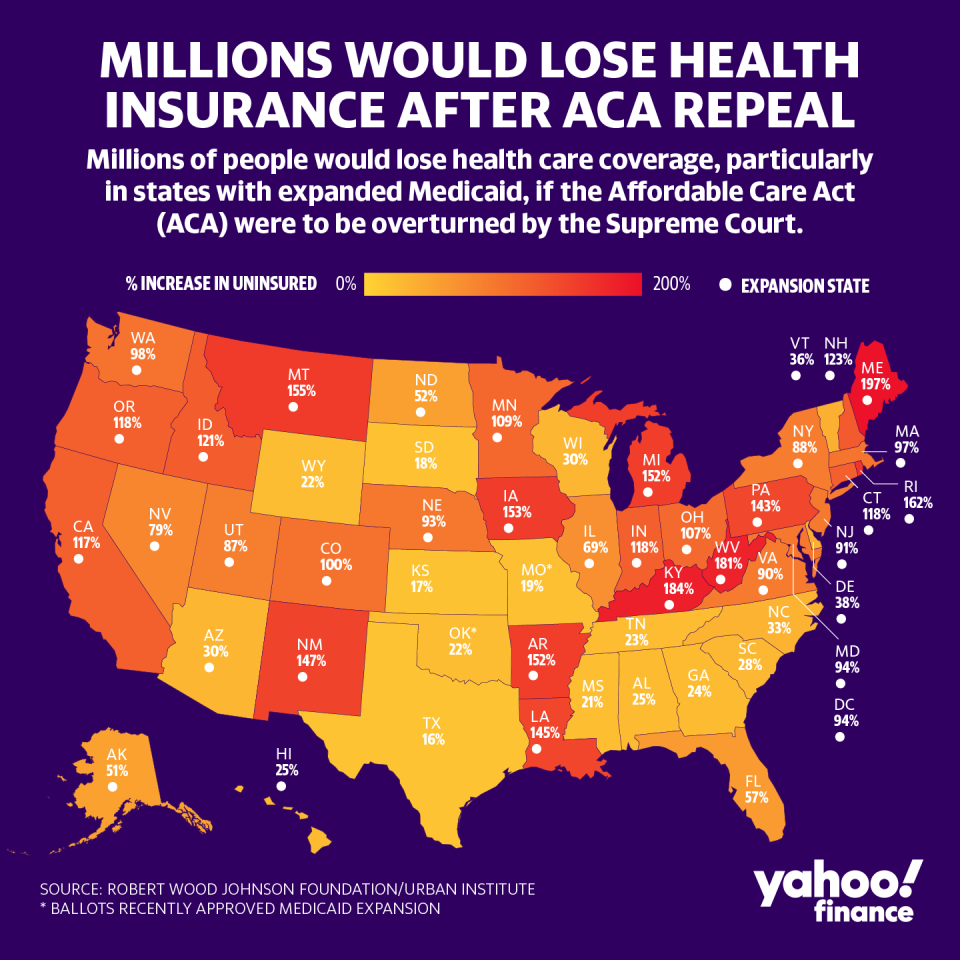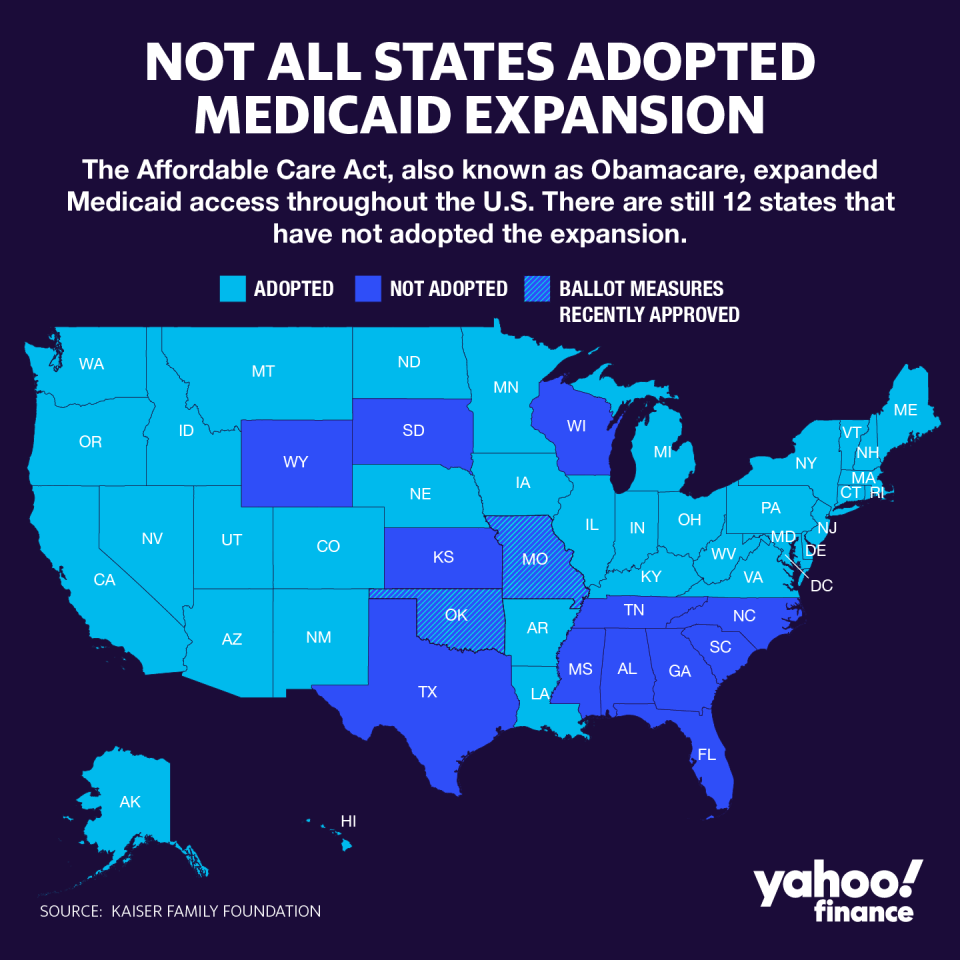Obamacare repeal would lead to more than 21 million Americans losing health insurance, study finds
The Supreme Court will hear arguments regarding the constitutionality of the Affordable Care Act (ACA), otherwise known as Obamacare, beginning on Nov. 10.
Depending on specifics of the ruling, the Court could either uphold the health care legislation’s constitutionality, invalidate only parts of the law, or overturn it completely in a decision expected in 2021.
And according to a new report from the Urban Institute and the Robert Wood Johnson Foundation, a repeal of the law would mean that more than 21 million Americans would lose their health insurance. That would translate to a 69% increase in the number of uninsured Americans.
“Invalidating this law with a pound of gavel ... would undoubtedly cause tremendous chaos through the health care system and state and federal government, and this chaos would be wrought for no positive return,” Linda Blumberg, an institute fellow at the Urban Institute, told Yahoo Finance.

A spike in uninsured rates
The report found that uninsured rates would spike across all racial and ethnic groups, including an 85% increase for both Black and white people, a 75% increase for both American Indians/Alaska Natives and people who are Asian/Pacific Islander, and approximately a 40% increase for Hispanic people.
“Overturning the ACA would clearly cause economic harm; the benefits come from maintaining it,” Blumberg said. “There is already strong empirical evidence that the ACA has reduced mortality, increased access to medical care, and reduced financial burdens associated with medical care, particularly for those with low incomes. This all allows people to be more productive and work more.”
Most states would see a significant increase in the number of uninsured, except for the states that did not adopt the Medicaid expansion: Alabama, Florida, Georgia, Kansas, Mississippi, Missouri, North Carolina, Oklahoma, South Carolina, South Dakota, Tennessee, Texas, Wisconsin, and Wyoming.
“The larger point here is that insurance companies, before the ACA was passed, had the power and the ability — and did on a routine basis — declare people uninsurable because of a preexisting condition,” Wendell Potter, a former executive for Cigna, told Yahoo Finance. “I’m afraid that is lot on a lot of people who don’t remember was it was like, and how so many millions of Americans could not buy coverage at any price. When you were declared uninsurable ... it was almost like a death sentence.”

Kansas — where 14% of its population lacks health insurance, among the highest in the nation — would only see a 17% increase in the number of uninsured. Meanwhile, Maryland would see a 197% increase.
Obamacare “has been shown to have significant economic benefits for states, particularly those that took advantage of the ACA's Medicaid eligibility expansion,” Blumberg said. “This has also been shown to be true for the financial strength of hospitals. Reforms in the ACA have also been shown to have strengthened the financial status of the Medicare program.”
She continued: “The ACA has made it possible for workers to start their own businesses without having to fear they wouldn't have access to adequate, affordable health insurance coverage, and it has allowed small employers (who are not efficient purchasers of health insurance due to their size) to more effectively compete for workers with larger employers (since they do not necessarily have to offer health insurance to attract the right workers; those workers can get coverage through the ACA marketplaces).”

‘The rest of the law has already been severed from the individual mandate’
The Supreme Court is hearing a case after a Texas court ruling ruled that the landmark law’s individual mandate, which implemented a tax penalty on those without health insurance before President Trump repealed the penalty in 2018, was unconstitutional. The Texas attorney general argued that the individual mandate being unconstitutional invalidated the entire law.
“The individual mandate is no longer enforced and hasn't been going back at least to the 2019 plan year (there is also evidence that the federal government was not enforcing it in 2018 to the same degree as required by law),” Blumberg said. “We know this has led to somewhat fewer people having insurance coverage than would have before, but the impact of eliminating it has been smaller than many people feared.”
She cited that the continued operation of the ACA without the individual mandate “is why this case is so absurd: The Texas Attorney General argues that the rest of the ACA cannot be severed from the individual mandate, but the facts are the opposite — the rest of the law has already been severed from the individual mandate and it continues to work well.”

Health policy experts have argued that if Congress were to simply pass a law nulling the individual mandate, the Supreme Court case would be moot, particularly since people have come to understand the health benefits available to them since the law went into effect.
“For all practical purposes, the mandate was eliminated in 2018/19 once the penalties were either not being enforced significantly (2018) or completely eliminated (2019),” Blumberg said. “If the Court vacates the existing toothless mandate language in the law and leaves the rest in place, there will be no discernible effect. Things will continue on as they have since 2019.”
Adding to the uncertainty over how the Supreme Court will rule on the case is the confirmation of Justice Amy Coney Barrett, who was previously critical of court rulings upholding the ACA.
Adriana Belmonte is a reporter and editor covering politics and health care policy for Yahoo Finance. You can follow her on Twitter @adrianambells.
READ MORE:
Obamacare repeal would bring a huge tax cut for the rich, research shows
Obamacare: Study highlights key benefit of Affordable Care Act ahead of Supreme Court arguments
Read the latest financial and business news from Yahoo Finance
Follow Yahoo Finance on Twitter, Facebook, Instagram, Flipboard, LinkedIn, YouTube, and reddit.
